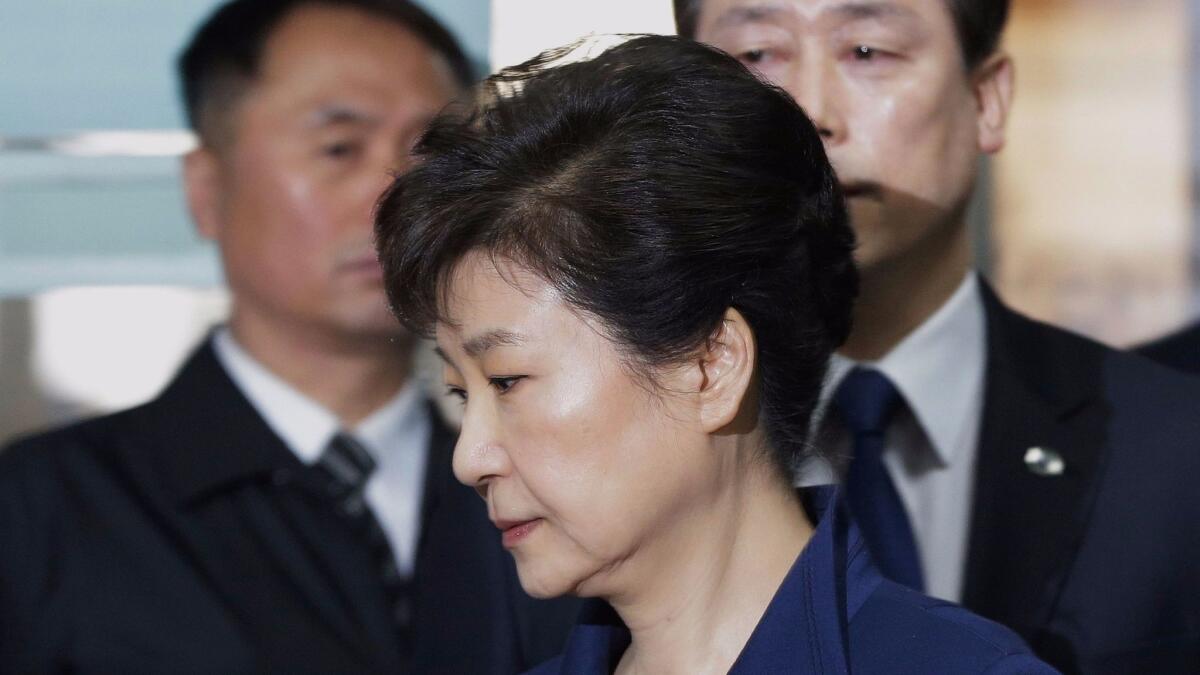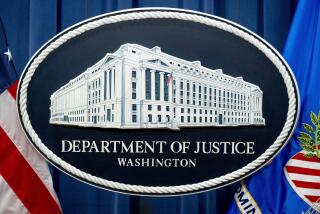Former South Korean President Park Geun-hye is formally indicted on corruption charges

- Share via
Reporting from SEOUL — South Korean prosecutors on Monday indicted former President Park Geun-hye on high-profile corruption charges that could potentially send her to jail for life.
It is the latest in a series of humiliations for Park, who was driven from office by massive and peaceful popular protests. Park was impeached late last year, officially stripped of power in March and has been in a detention facility near Seoul since being arrested last month on allegations that she colluded with a confidante to extort businesses, take bribes and commit other wrongdoing.
The indictment by Seoul prosecutors covers multiple charges, including abuse of power, extortion, bribery and the leaking of state secrets.
Park will remain jailed and be escorted from the detention center to a Seoul court for a trial that is to start in coming weeks and could take as long as six months. It is still unclear if the trial will start before a May 9 special election that will determine her successor.
Prosecutors also indicted Shin Dong-bin, the chairman of Lotte Group, South Korea’s fifth-largest business conglomerate, on a charge of offering a bribe of $6 million to Park and her confidante in exchange for a lucrative government license to open a new duty-free shop.
Park, 65, was elected South Korea’s first female president in late 2012. The country will now watch as she is forced to stand in court while handcuffed, bound with rope and possibly dressed in prison garb.
If convicted, her bribery charge carries the biggest legal punishment, ranging from 10 years to life imprisonment.
Though deeply unpopular among many South Koreans, Park still has supporters, and some conservative politicians and media outlets are already demanding that authorities pardon her if she’s convicted.
South Korea pardoned two of its convicted former leaders in the late 1990s in a bid for national reconciliation amid financial crisis, and its court had until recently showed leniency toward punishing corrupt business tycoons because of worries about hurting the economy.
Though surveys show a majority of South Koreans backed Park’s removal from office and arrest, some of her last remaining ultra-conservative supporters still stage rallies in downtown Seoul every weekend.
Such rallies could pressure whoever becomes her successor. The new leader will also face increasing North Korean nuclear threats and diverse economic woes.
Park’s scandal triggered huge political turmoil in South Korea, with millions taking to the streets to call for her ouster for months before her supporters launched their own protests. Dozens of high-level figures, including Park’s friend of 40 years, Choi Soon-sil, top administration officials and Samsung heir Lee Jae-yong have already been indicted and await separate criminal trials.
Park and Choi allegedly conspired with one of Park’s top presidential advisors to pressure 18 business groups, including Samsung, to donate $69 million for the launch of two nonprofit foundations controlled by Choi. Prosecutors also accuse Park and Choi of taking bribes from Samsung and Lotte and blacklisting artists critical of Park’s government to deny them state support.
Park has denied any legal wrongdoing, arguing that she only got help from Choi to edit some presidential speeches and deal with public relations.
NEWSLETTER: Get the day’s top headlines from Times Editor Davan Maharaj »
Park is the daughter of late dictator Park Chung-hee, one of the most divisive figures in South Korean history. Some recall him as an enormous human rights abuser while others credit him for spearheading a rapid economic rise in the 1960 and ’70s. Critics say Park’s 2012 election wouldn’t have happened without conservatives’ nostalgia for her father.
Park Chung-hee’s iron-fisted 18-year rule ended after he was gunned down by his spy chief in 1979, five years after his wife was killed during an assassination attempt that targeted her husband.
Park Geun-hye once described Choi, 60, as someone who helped her when she had difficulties in the past, an apparent reference to her parents’ deaths.
ALSO
Pence warns North Korea that ‘era of strategic patience is over’
South Korea says bones found near ferry wreckage were from animals
More to Read
Sign up for Essential California
The most important California stories and recommendations in your inbox every morning.
You may occasionally receive promotional content from the Los Angeles Times.










